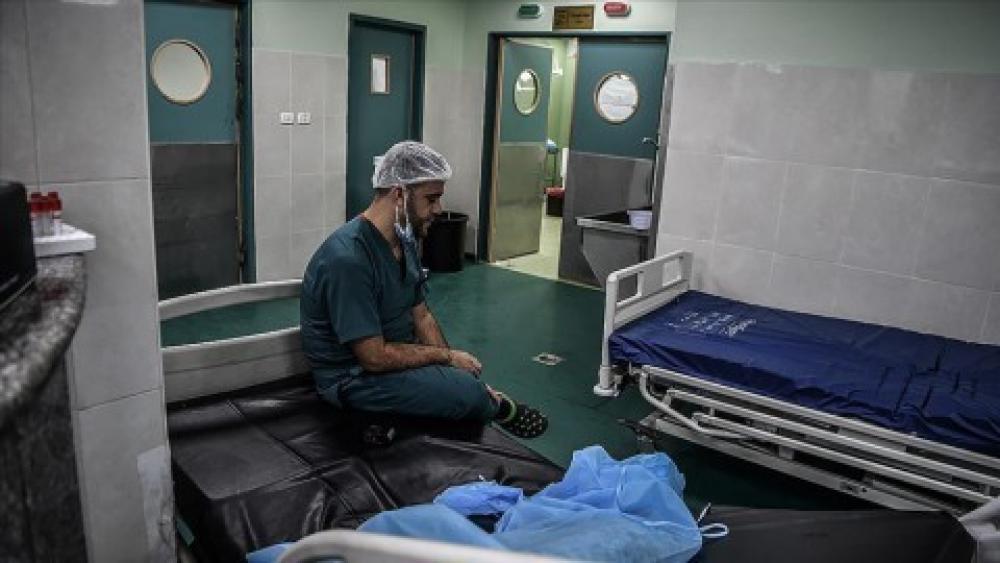
Gaza – Saba:
The organization Doctors Without Borders (MSF) reported that Gaza European Hospital in Khan Younis, southern Gaza Strip—the last facility providing cancer treatment in the enclave—has been rendered non-functional after being bombed by Israeli forces on May 13.
In posts on the platform X this Friday, the organization noted that the hospital was one of the last remaining lifelines in Gaza’s devastated healthcare system.
MSF clarified that Nasser Hospital, supported by their teams, is now the only general hospital in southern Gaza’s Khan Younis. It was also bombed on the same day, hours before the attack on the Gaza European Hospital—marking the second strike on Nasser in less than two months.
The organization stressed that Gaza’s residents are struggling to access life-saving healthcare, with the remaining hospitals—mostly operating partially—facing severe overcrowding. MSF condemned the repeated attacks on medical facilities as further evidence that Israeli authorities are making the Strip "unlivable."
Meanwhile, Dr. Muhammad Abu Salmiya, director of Al-Shifa Hospital in Gaza City, warned that the healthcare sector in Gaza is "losing complete control" due to the unprecedented scale of Israeli targeting. He described the medical situation as "on the verge of death."
In press statements on Friday, Abu Salmiya stated that the intensity and nature of Israeli attacks are "the largest and most dangerous," with dozens of fatalities arriving daily alongside critical injuries.
He added that the healthcare system, particularly in Gaza City and the northern governorate, is operating at less than 15% of its pre-war capacity after Israeli forces destroyed 85% of its capabilities through repeated bombings of hospitals and clinics.
Hospitals are now overwhelmed, struggling to handle the influx of casualties amid a severe shortage of beds—only 1,980 remain out of 3,412 previously available in government and private hospitals.
Intensive care units are under immense pressure, with most injuries requiring critical care, while only 127 ICU beds remain—less than half the pre-war number—despite the surge in casualties.
Abu Salmiya warned that the deteriorating situation signals an imminent collapse of the healthcare system, exacerbated by ongoing attacks on civilian infrastructure and displacement zones, declaring: "The healthcare system is dying."
The organization Doctors Without Borders (MSF) reported that Gaza European Hospital in Khan Younis, southern Gaza Strip—the last facility providing cancer treatment in the enclave—has been rendered non-functional after being bombed by Israeli forces on May 13.
In posts on the platform X this Friday, the organization noted that the hospital was one of the last remaining lifelines in Gaza’s devastated healthcare system.
MSF clarified that Nasser Hospital, supported by their teams, is now the only general hospital in southern Gaza’s Khan Younis. It was also bombed on the same day, hours before the attack on the Gaza European Hospital—marking the second strike on Nasser in less than two months.
The organization stressed that Gaza’s residents are struggling to access life-saving healthcare, with the remaining hospitals—mostly operating partially—facing severe overcrowding. MSF condemned the repeated attacks on medical facilities as further evidence that Israeli authorities are making the Strip "unlivable."
Meanwhile, Dr. Muhammad Abu Salmiya, director of Al-Shifa Hospital in Gaza City, warned that the healthcare sector in Gaza is "losing complete control" due to the unprecedented scale of Israeli targeting. He described the medical situation as "on the verge of death."
In press statements on Friday, Abu Salmiya stated that the intensity and nature of Israeli attacks are "the largest and most dangerous," with dozens of fatalities arriving daily alongside critical injuries.
He added that the healthcare system, particularly in Gaza City and the northern governorate, is operating at less than 15% of its pre-war capacity after Israeli forces destroyed 85% of its capabilities through repeated bombings of hospitals and clinics.
Hospitals are now overwhelmed, struggling to handle the influx of casualties amid a severe shortage of beds—only 1,980 remain out of 3,412 previously available in government and private hospitals.
Intensive care units are under immense pressure, with most injuries requiring critical care, while only 127 ICU beds remain—less than half the pre-war number—despite the surge in casualties.
Abu Salmiya warned that the deteriorating situation signals an imminent collapse of the healthcare system, exacerbated by ongoing attacks on civilian infrastructure and displacement zones, declaring: "The healthcare system is dying."